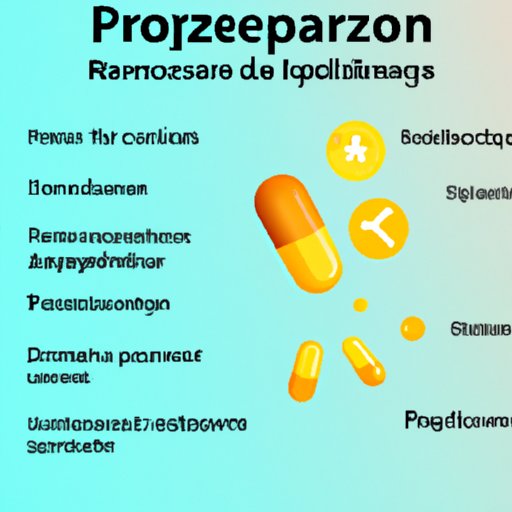Introduction
Prozac is an antidepressant that has been used by millions of people since it was approved by the Food and Drug Administration (FDA) in 1987. Its purpose is to help treat depression and other mood disorders, such as anxiety and panic disorder. It is also sometimes prescribed for people with obsessive-compulsive disorder (OCD). This article is intended for anyone who is considering taking Prozac or wants to better understand how it works.
A Comprehensive Guide to How Prozac Works in the Brain
Prozac works by targeting certain chemicals in the brain known as neurotransmitters. These neurotransmitters are responsible for sending messages between nerve cells, which in turn influence mood, behavior, and emotions. When these neurotransmitters become unbalanced, it can lead to symptoms of depression, anxiety, and other mental disorders.
Exploring the Effects of Prozac on Mental Health
Prozac works by increasing the levels of serotonin in the brain. Serotonin is a neurotransmitter that helps regulate mood, appetite, sleep, memory, and learning. By increasing the amount of serotonin available in the brain, Prozac can help improve symptoms of depression, anxiety, and other mood disorders.
Research has found that Prozac can be effective in treating depression. In a study published in The British Journal of Psychiatry, researchers found that Prozac was more effective than placebo in reducing symptoms of depression. Additionally, the study found that Prozac was well tolerated and had few side effects.
Examining the Mechanisms of Action for Prozac
The exact mechanisms of action for Prozac are not fully understood. However, research suggests that Prozac works by inhibiting the reuptake of serotonin. This means that the neurotransmitter stays in the brain longer, resulting in increased levels of serotonin and improved mood.
In addition, Prozac may also have an effect on the release of other neurotransmitters, such as dopamine and norepinephrine. Research has found that these neurotransmitters may also play a role in improving symptoms of depression.

An Overview of How Prozac Treats Depression
Prozac is typically prescribed as part of a treatment plan for depression. It is usually taken once a day, and the dose may need to be adjusted over time to find the right balance. In general, it takes several weeks for Prozac to start working and for the patient to experience the full effects.
Investigating the Neurochemical Responses to Prozac Treatment
When Prozac is taken, it binds to serotonin receptors in the brain. This helps prevent the reuptake of serotonin, which increases the amount of serotonin available in the brain. This, in turn, helps to improve mood and reduce symptoms of depression.
In addition, Prozac can also affect the release of other neurotransmitters. Studies have found that Prozac can increase the release of dopamine, which is thought to be involved in regulating mood, motivation, and reward processing. It can also increase the release of norepinephrine, which plays a role in regulating stress and alertness.
Analyzing the Benefits and Side Effects of Prozac Use
Like all medications, Prozac can cause side effects. Common side effects include nausea, headache, insomnia, and dry mouth. Other less common side effects include anxiety, restlessness, weight loss, and sexual dysfunction.
However, Prozac can also have positive effects. It can help improve mood, reduce anxiety, and improve overall quality of life for those suffering from depression and other mood disorders. According to a study published in JAMA Psychiatry, Prozac was found to be effective in reducing symptoms of major depressive disorder compared to placebo.
Conclusion
Prozac is an antidepressant that has been used to treat depression, anxiety, and other mood disorders since 1987. It works by increasing the levels of serotonin in the brain, which helps to regulate mood, behavior, and emotions. In addition, Prozac can also affect the release of other neurotransmitters, such as dopamine and norepinephrine. Although Prozac can cause some side effects, it can also have positive effects, such as reducing symptoms of depression and improving overall quality of life.
In conclusion, Prozac is an effective treatment for depression and other mood disorders. It works by targeting specific neurochemicals in the brain, which can help improve mood and reduce symptoms of depression. Although it can cause some side effects, it can also provide significant benefits for those suffering from mental health issues.
(Note: Is this article not meeting your expectations? Do you have knowledge or insights to share? Unlock new opportunities and expand your reach by joining our authors team. Click Registration to join us and share your expertise with our readers.)
